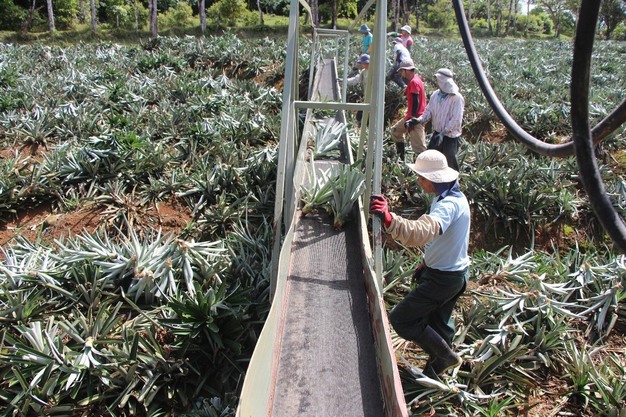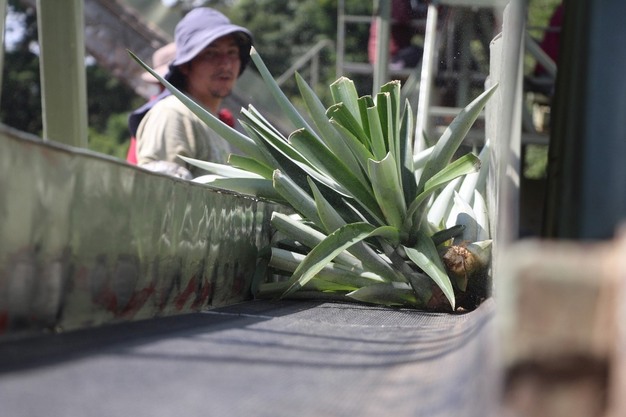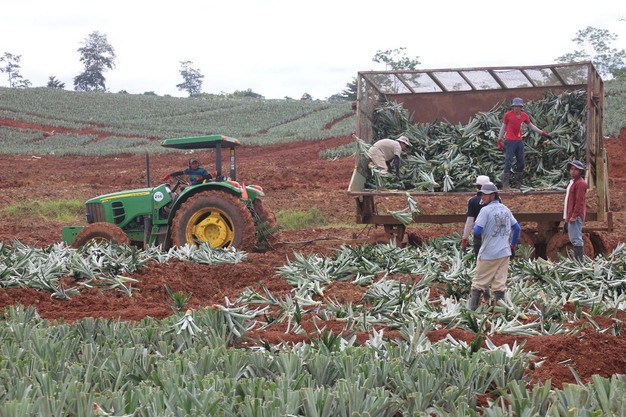Costa Rica’s pineapple production accounts for 30% of the country’s agricultural GDP and nearly 2% of its national GDP. According to data from CANAPEP (National Chamber of Pineapple Producers and Exporters), the sector generates nearly 38,000 direct and 148,000 indirect jobs. 54% of exports are sent to the North American market and 44% to Europe.
Since 2006, CANAPEP has coordinated the Socio-Environmental Commission for Pineapple Production (COSAP), an inter-institutional body that includes ministries, universities, and private sector actors. The COSAP created the Technical Manual for the Sustainable Production of Pineapple (MT-PSP). This tool organizes the minimum criteria that farms must meet to be affiliated and stay within the system.
 © CANAPEP
© CANAPEP
The manual is structured in five areas: Environmental control, social responsibility, occupational health, personnel training, and operational control. To join CANAPEP, a farm must pass an individual technical diagnosis with at least 70% overall compliance and no failures in critical points. If it does not reach this threshold, it must implement an improvement plan before being re-evaluated. This process is repeated periodically in each affiliated farm.
CANAPEP’s technical team conducts evaluations that comply with current national regulations. The manual is updated as labor, environmental, or health laws change, and is currently in its 17th edition. In 2024, the overall average compliance stood at 96%.
 © CANAPEP
© CANAPEP
On the environmental front, a life cycle analysis (LCA) was incorporated from planting to port. The LCA identified opportunities to reduce the impact of agrochemical use and resource consumption, among other things. It also aligns with 15 of the 17 United Nations Sustainable Development Goals.
On the labor front, the diagnostics verify compliance with Costa Rican legislation: Compulsory social security affiliation, formal contracts, minimum wages, and prevention of practices such as subcontracting through contractors. Compliance with the guidelines of the Occupational Health Council is also verified. Women’s participation in the workforce reaches 25%.
 © CANAPEP
© CANAPEP
CANAPEP was also accredited as an Inspection Body by the Costa Rican Accreditation Body under the INTE/ISO/IEC 17020 standard, enabling it to conduct independent evaluations of farms, packing plants, and pineapple by-product processing facilities.
The legally registered CANAPEP Affiliate seal can be voluntarily used by companies that meet the system’s requirements. It is not a trademark, but it signifies that the product has undergone the specified technical process.
This model aims to ensure ongoing compliance with environmental, social, operational, and legal standards within a key sector of the Costa Rican economy.
For more information:
Abel Chaves Trigueros
CANAPEP
Costa Rica
Tel: +506 2296-2410
Email: [email protected]
www.canapep.com
Source: The Plantations International Agroforestry Group of Companies
